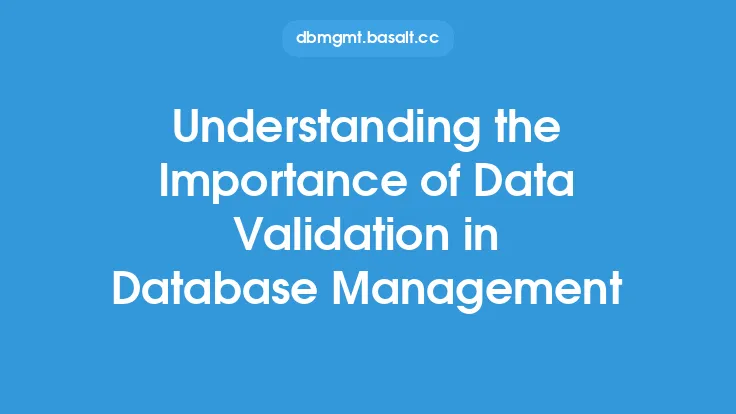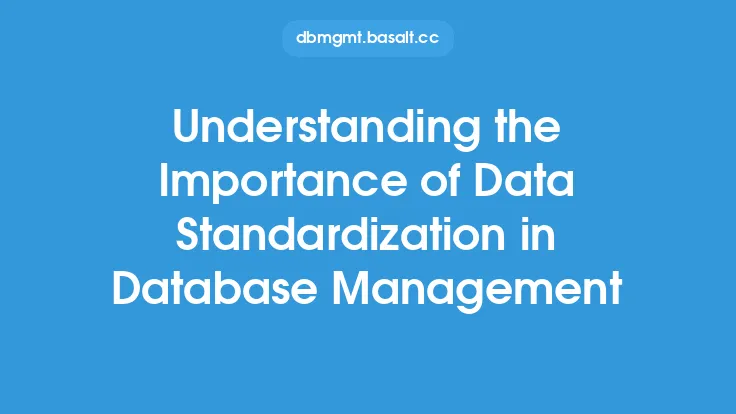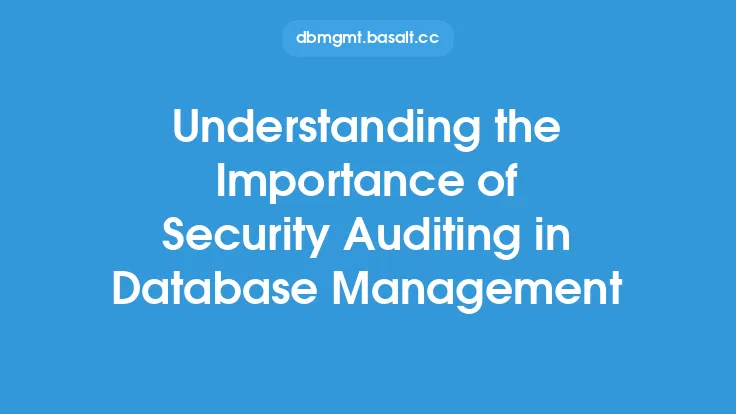Data quality is a critical aspect of database management, as it directly affects the reliability, accuracy, and usefulness of the data stored in a database. High-quality data is essential for making informed business decisions, identifying trends, and optimizing operations. In this article, we will delve into the importance of data quality in database management, exploring its definition, benefits, and best practices for ensuring data quality.
Definition of Data Quality
Data quality refers to the degree to which data is accurate, complete, consistent, and reliable. It encompasses various aspects, including data accuracy, data completeness, data consistency, data timeliness, and data relevance. Data quality is not a one-time achievement, but rather an ongoing process that requires continuous monitoring and improvement. It involves identifying and addressing data quality issues, such as errors, inconsistencies, and inaccuracies, to ensure that the data is trustworthy and usable.
Benefits of High-Quality Data
High-quality data offers numerous benefits, including improved decision-making, increased efficiency, and enhanced customer satisfaction. With accurate and reliable data, organizations can make informed decisions, identify trends, and optimize operations. High-quality data also enables organizations to respond quickly to changing market conditions, customer needs, and regulatory requirements. Furthermore, high-quality data helps to build trust and credibility with customers, partners, and stakeholders, which is essential for long-term success.
Consequences of Poor Data Quality
Poor data quality, on the other hand, can have severe consequences, including incorrect decisions, wasted resources, and damaged reputation. Inaccurate or incomplete data can lead to incorrect analysis, flawed conclusions, and misguided decisions. Poor data quality can also result in wasted resources, as organizations may spend unnecessary time and money correcting errors or reworking processes. Moreover, poor data quality can damage an organization's reputation, as customers, partners, and stakeholders may lose trust in the organization's ability to provide accurate and reliable information.
Data Quality Dimensions
Data quality can be evaluated across several dimensions, including accuracy, completeness, consistency, timeliness, and relevance. Accuracy refers to the degree to which data is free from errors and inaccuracies. Completeness refers to the degree to which data is comprehensive and includes all necessary information. Consistency refers to the degree to which data is consistent in format, structure, and content. Timeliness refers to the degree to which data is up-to-date and reflects current conditions. Relevance refers to the degree to which data is relevant to the organization's goals, objectives, and operations.
Data Quality Checks
To ensure data quality, organizations can implement various data quality checks, including data validation, data verification, and data cleansing. Data validation involves checking data against predefined rules and constraints to ensure that it is accurate and consistent. Data verification involves checking data against external sources to ensure that it is accurate and up-to-date. Data cleansing involves identifying and correcting errors, inconsistencies, and inaccuracies in the data.
Data Quality Tools and Technologies
Several data quality tools and technologies are available to support data quality initiatives, including data quality software, data profiling tools, and data governance platforms. Data quality software provides automated data quality checks, data validation, and data cleansing capabilities. Data profiling tools provide detailed analysis and visualization of data quality issues. Data governance platforms provide a centralized framework for managing data quality, data security, and data compliance.
Best Practices for Ensuring Data Quality
To ensure data quality, organizations should follow best practices, including establishing clear data quality policies, defining data quality standards, and implementing data quality processes. Organizations should also provide training and awareness programs to educate employees on the importance of data quality and their role in maintaining it. Additionally, organizations should continuously monitor and evaluate data quality, using metrics and benchmarks to measure progress and identify areas for improvement.
Data Quality and Database Design
Data quality is closely related to database design, as a well-designed database can help to ensure data quality. A well-designed database should include features such as data validation, data normalization, and data indexing to ensure data accuracy, consistency, and efficiency. Database designers should also consider data quality requirements, such as data completeness, data timeliness, and data relevance, when designing the database.
Data Quality and Data Integration
Data quality is also critical in data integration, as integrated data must be accurate, consistent, and reliable. Data integration involves combining data from multiple sources, which can introduce data quality issues, such as errors, inconsistencies, and inaccuracies. To ensure data quality in data integration, organizations should implement data quality checks, such as data validation and data verification, to ensure that the integrated data is accurate and reliable.
Conclusion
In conclusion, data quality is a critical aspect of database management, as it directly affects the reliability, accuracy, and usefulness of the data stored in a database. High-quality data is essential for making informed business decisions, identifying trends, and optimizing operations. Organizations should establish clear data quality policies, define data quality standards, and implement data quality processes to ensure data quality. By following best practices and using data quality tools and technologies, organizations can ensure high-quality data and achieve their goals and objectives.





